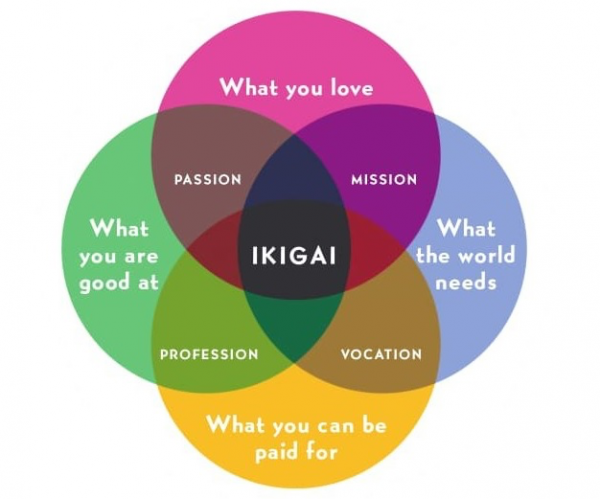Ikigai is an age-old Japanese ideology that has been associated with the Japan’s long life expectancy. A combination of the Japanese words “iki” (生き), which means “life,” and “gai” (甲斐), which is used to describe value or worth, Ikigai is all about finding joy in life through purpose.
In other words, your Ikigai is what gets you up every morning and keeps you going.
Origin of Ikigai
The origin of the word Ikigai goes back to the Heian period (794 to 1185). Akihiro Hasegawa who is a clinical psychologist and an expert in Ikigai evolution released a research paper in 2001 where he wrote that the word “gai” comes from the word “kai” which translates to “shell” in Japanese.
During the Heian period, shells were extremely valuable, so the association of value is still inherently seen in this word. It can also be seen in similar Japanese words like hatarakigai, (働きがい) which means the value of work, or yarigai ~ga aru (やり甲斐がある), meaning “it’s worth doing it.”
Meaning of Ikigai
Gai is the key to finding your purpose, or value in life. Ikigai is the balance found at the intersection between your passion, mission, vocation and profession. Thus Ikigai is what you understand by four main qualities : what you are good at, what the world needs, what you can be paid for, and what you love.
Must Read: POWER OF DAIMOKU (Chanting Nam Myoho Renge Kyo)
Where Ikigai is practiced ?

Okinawa, the southern island off of mainland Japan, is home to one of the highest ratios of centenarians to population. Okinawa is also a hotbed of ikigai ideology. Here the mild weather, healthy diet, and low level of stress are also factors, but it’s the island’s active population of non-retiring, purpose-driven residents that links them to other long-living communities in Sardinia, Italy and Icaria, Greece.
How to Live The Ikigai Way ?
According to Hector and Francesc authors of the book Ikigai : The Japanese Secret to a Long and Happy Life, you can start by putting together a note of the top 10 things you have spent your time on this week. After writing them down, ask yourself if those things are adding purpose to your life.
Ask yourself: is it something that I love doing? Is it something the world needs? Is it something I’m good at? or Is it something I can get paid for?
Your Ikigai has nothing to do with your capability to earn or being more professionally active or your ambition. Your Ikigai can be an answer to a question what I love doing most? And it could be growing your own vegetables, or gardening or cooking or even getting together with your friends.
Various research has uncovered that just like music taste, fashion and, opinions, a person’s ikigai can change and morph with age, so chances are they need a semi-regular checkup.
Ikigai: The Japanese Secret to a Long and Happy Life
Hector Garcia, a writer who has released a number of books on this theory, including Ikigai: The Japanese Secret to a Long and Happy Life ,released in English recently , believes that this ikigai shouldn’t just be linked to the elderly folks. In fact, it’s currently more popular with younger people both in and outside of Japan.
“If you can find pleasure and satisfaction in what you do and you’re good at it, congratulations you have found your ikigai.”
@religionworldin
[video_ads]
[video_ads2]









